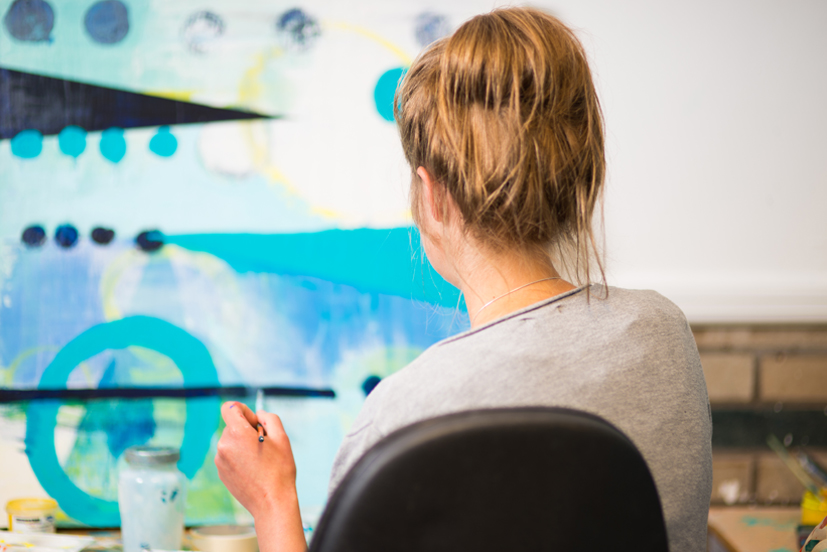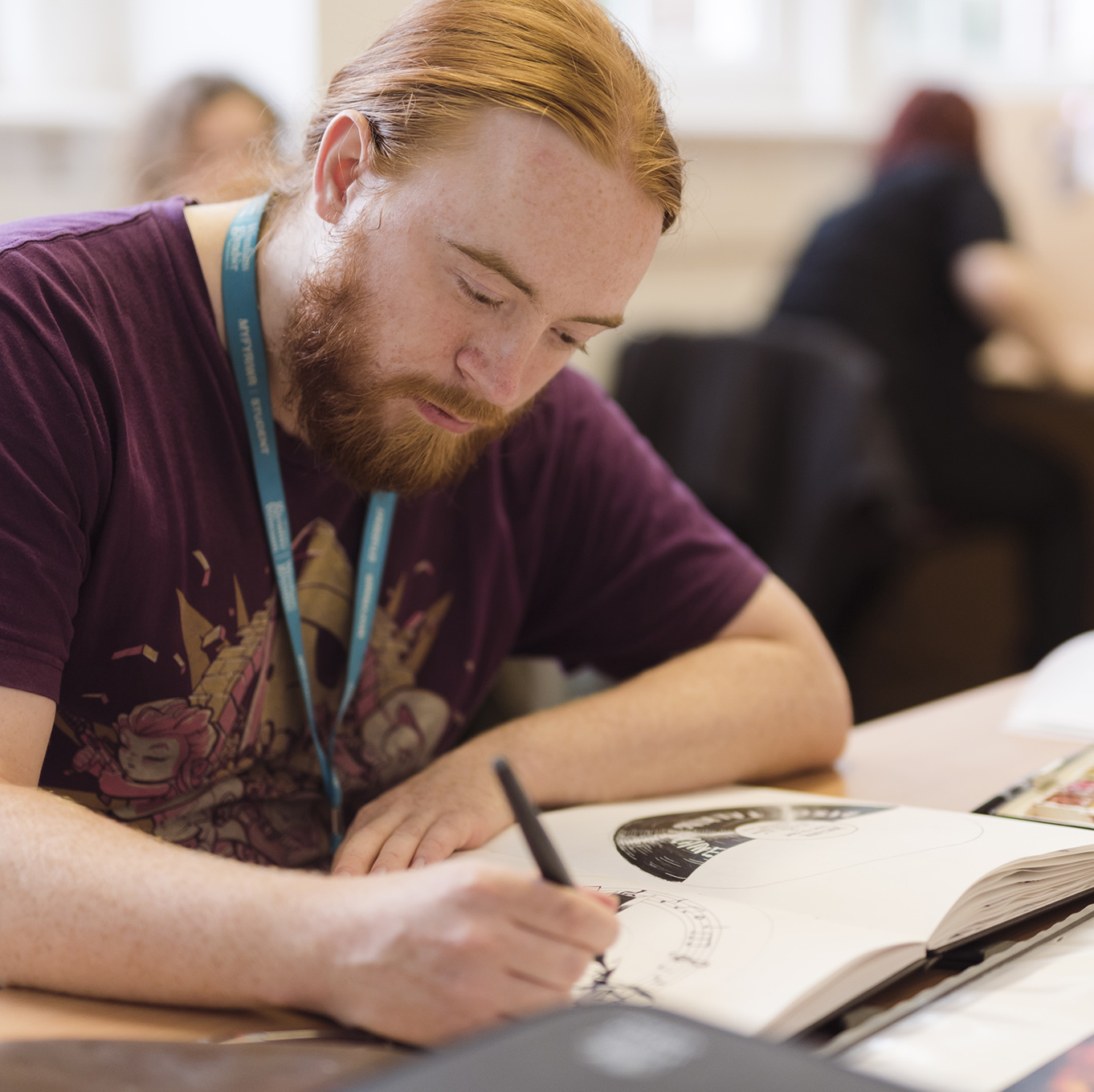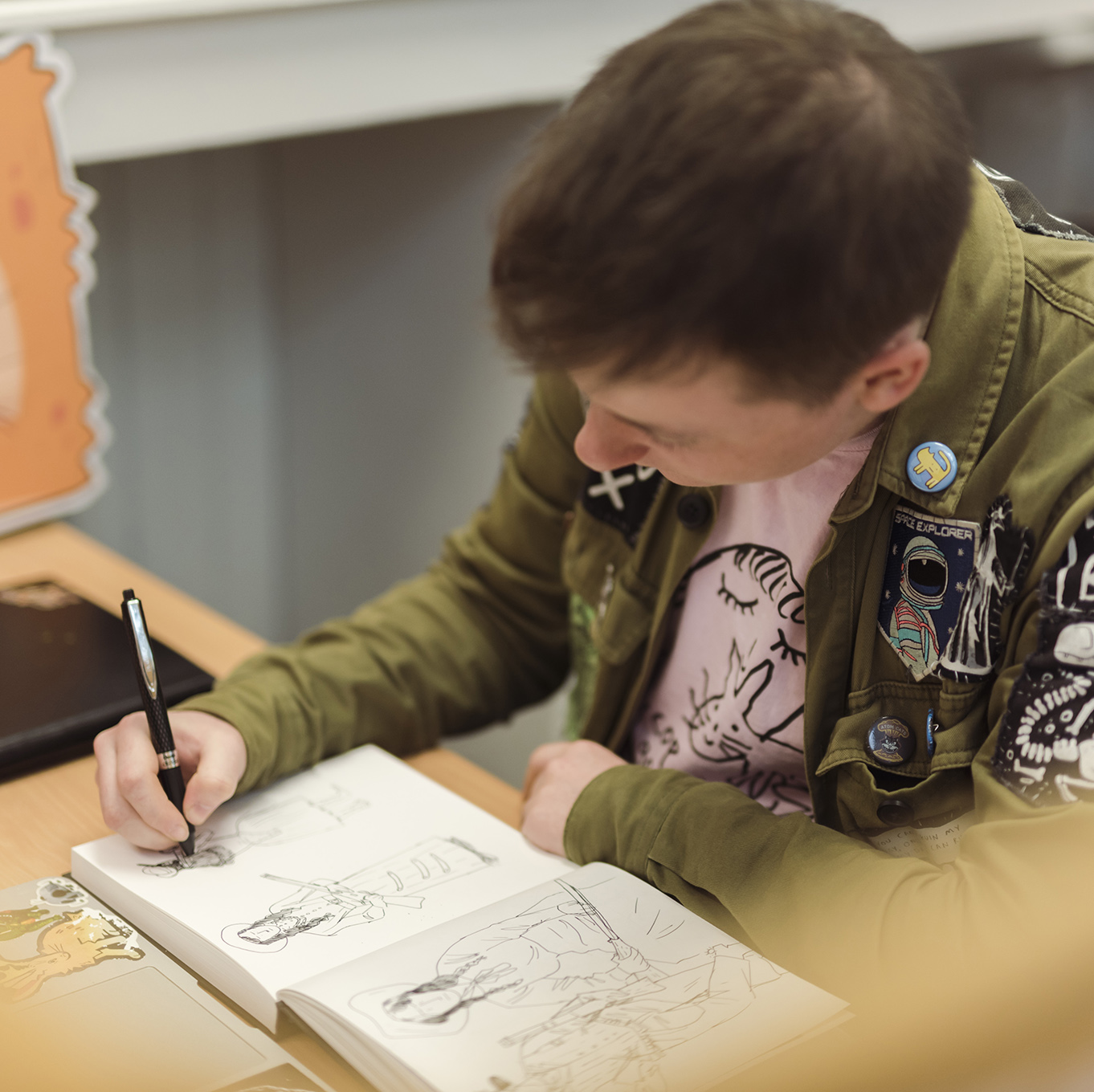
Course details
UCAS Code
W290
Year of entry
2026
Duration
4 YRS (FT)
UCAS Tariff
48-72
Institution Code
G53
Location
Wrexham
Course Highlights
Showcase
your work in public exhibitions
Learn
from practicing artists and scholars
Access
state-of-the-art facilities
Why choose this course?
The BA (Hons) Graphic Design course is designed to equip you with the essential skills and knowledge required to excel in the dynamic field of graphic design. Through a blend of theoretical studies and practical projects, you'll explore various aspects of visual communication, preparing you for a successful career in the creative industries.
You will:
- Access modern studios, workshops, and digital labs to enhance your learning experience
- Participate in guest lectures, field trips, and workshops led by industry professionals
- Apply your knowledge through hands-on projects that mirror real-world design challenges
- Connect with a vibrant community of creatives and potential employers
- Qualify for a free and full subscription to Adobe Creative Cloud for the duration of study
- Showcase your work in public exhibitions, gaining exposure and professional experience
- Learn from practicing artists and scholars with significant industry experience
- Be introduced to professional creative processes and encouraged to expand your abilities through workshops and practical projects
- Learn how to interpret a brief, identify, and solve problems, develop creative individuality, and produce a professional portfolio
- Gain personal, professional, and entrepreneurial skills including working as a freelance designer: from marketing and self-promotion to contracts, invoices and working with clients
- Be encouraged to work on live briefs and competitions

Art and Designat Wrexham University
Key course features
- If you have been out of education for a while or looking for a career change and undecided as to which discipline to choose, a foundation year is an opportunity to explore and develop core skills in art and design. A foundation year can be a standalone accreditation or a precursor for a chosen degree programme.
- Learn how to create compelling images, work to professional standards, and understand how your work fits into the industry.
- Be introduced to a broad range of creative skills, from the generation of ideas to their technical production through printmaking, traditional and digital media, with an emphasis on design and the development of a unique personal style.
- Engage with a wide range of modules covering design fundamentals, typography, digital skills, and professional practice.
- Develop proficiency in leading design software and contemporary design techniques.
- We have an in-house prototype publishing house where you are able to experiment with alternative binding and folding systems. Also, in the faculty, we boast a two colour Risograph printer, a modern screen-printing facility, 3D printers, laser and traditional cutters and sublimation printing, all of which can help you realise your projects in prototype.
- Our graphic design department boasts a rich legacy, with esteemed alumni such as Jenny-Lee Fisher, Darryl Higgins, Gaz Lawn, Andy Garside, Andy Cheetham and David Barraclough.
- You will benefit from a personalised study program that encourages an outward perspective, engaging in live briefs with local, national, and international impact. Participate in prestigious competitions like D&AD Impact Awards; D&AD New Blood Awards; AGDA Best Design Awards; Indigo Awards; ADC Annual Awards; The Design Kids Awards; TDC Typeface Design Competition; The Young Ones ADC Competition and the World Brand Design Student Awards.
- Due to our intimate and exclusive cohorts, we offer frequent 1-2-1 contact, an open studio policy and flexible workspaces for your entire course.
- As a member of our energetic creative community, you will forge lasting connections and valuable professional networks. Our programme encourages an environment where industry experts and alumni return each year to regularly share their insights with each new generation of commercial designers.
What you will study
YEAR 1 (FOUNDATION YEAR)
The foundation year will introduce you to the key elements of art and design. You will explore the creative thought process relating to various art and design disciplines, developing your ability to put ideas down on paper quickly. There will be a range of practice assignments that will increase your recognition of strong ideas and original concepts.
MODULES
- Study Skills for Success (Core): This module will equip you with the essential skills needed to thrive in a digital learning environment. It covers time management, research techniques, academic writing, and digital literacy, ensuring that you can navigate online platforms, organise projects, and communicate ideas effectively in higher education.
- Arts Engagement (Core): You will actively explore and respond to art, developing observational and analytical skills. Through hands-on experiences, discussions, and research, you will learn to interpret different artistic styles, techniques, and meanings. This module fosters confidence in engaging with art both critically and creatively.
- Visual Language (Core): This module introduces the fundamental principles of creative thinking in art and design. It explores how elements like composition, colour, and form contribute to visual communication. You will experiment with different media and approaches to develop your own artistic voice.
- Creative Reasoning (Core): Focusing on the practical application of ideas, this module encourages you to consider space, materials, and audience when creating art. You will develop problem-solving skills, refine your decision-making, and experiment with techniques to enhance your creative process.
- Arts in Context (Core): You will examine how art connects to history, culture, and society. By studying artistic movements and influences, you will learn to analyse and interpret artworks within their broader contexts, gaining a deeper understanding of how art reflects and shapes the world around us.
- Progression Project (Core): In this module, you will display your work at a public gallery exhibition, allowing you to celebrate your achievements and develop your confidence.
- Welsh for First Time Learners (Optional): This module provides an introduction to the Welsh language for those taking their first steps.
YEAR 2 (LEVEL 4)
In year two, you will be introduced to the fundamental principles of graphic design, focusing on building a strong foundation in both theory and practice.
MODULES
- Design Fundamentals: Learn about composition, colour theory, and basic design software tools.
- Typography Basics: Explore typefaces, text arrangement, and the role of typography in visual communication.
- History and Theory of Design: Study key design movements and their cultural contexts.
- Drawing and Visual Studies: Enhance your sketching and observational skills.
- Introduction to Branding: Understand the basics of visual identity and brand design concepts.
YEAR 3 (LEVEL 5)
Year three builds upon the foundational skills, encouraging independent creative thinking and introducing industry-relevant practices.
MODULES
- Advanced Typography and Layout: Delve deeper into typographic hierarchy and layout principles.
- Digital Skills Expansion: Advance your proficiency in design software and explore motion graphics and web design principles.
- User Experience (UX) and User Interface (UI) Basics: Learn to create user-friendly digital interfaces.
- Branding and Identity: Develop cohesive brand elements through real or hypothetical client briefs.
- Design Theory and Analysis: Engage in contemporary design issues and critique sessions.
YEAR 4 (LEVEL 6)
The final year focuses on preparing you for the professional design world, emphasizing specialised skills, major project work, and portfolio refinement.
MODULES
- Specialised Modules and Electives: You can choose to specialise in areas like UX/UI design, motion graphics, digital illustration, or other specific design paths.
- Final Major Project: Undertake a self-directed project showcasing your unique design voice.
- Portfolio Development and Finalisation: Refine and present a cohesive, professional body of work.
- Professional Practice and Career Preparation: Participate in workshops covering CV creation, portfolio presentation, and interview techniques.
- Research Project: Conduct an in-depth study on a design-related topic.
The information listed in this section is an overview of the academic content of the programme that will take the form of either core or option modules. Modules are designated as core or option in accordance with professional body requirements and internal academic framework review, so may be subject to change.
Entry requirements & applying
Our general requirement for the foundation year is 48-72 UCAS tariff points but all applications are considered individually and we consider work experience, vocational training/qualifications, as well as motivation and potential to succeed.
The programme welcomes applications from anyone who can demonstrate a commitment to the subject and the potential to complete their chosen programme successfully. This can be established by showing appropriate academic achievements or by demonstrating that they possess the knowledge and ability equivalent to the academic qualifications.
Candidates may be interviewed and asked to display a portfolio of their work. Experience may also be taken into consideration depending on the extent and depth of such subject knowledge. Students from overseas, or who are unable to attend an interview, are asked to send their portfolio of work digitally for consideration.
An admissions tutor considers each application individually. Different qualifications are considered, including Scottish Higher, Irish Leaving Certificate, the Welsh Baccalaureate, the International Baccalaureate, Access courses, BTEC, VCE, GNVQ, A and AS levels as well as other overseas qualifications.
Progression from HND / FDA
Applicants with relevant HND qualifications, or a foundation degree in a relevant Art and Design subject area may progress onto Level 6 of a BA subject to Glyndŵr University’s RP(E)L procedures.
Teaching & Assessment
You will experience a blend of lectures, seminars, practical workshops, and project-based learning. Assessment methods include essays, exams, portfolios, and presentations, designed to evaluate both your theoretical understanding and practical application of design concepts.
Teaching and Learning
We offer workshops and support sessions in areas such as academic writing, effective note-making and preparing for assignments.
Students can book appointments with academic skills tutors dedicated to helping deal with the practicalities of university work. Our student support section has more information on the help available.
In terms of particular needs, the University’s Inclusion Services can provide appropriate guidance and support should any students require reasonable adjustments to be made because of a recognised prevailing disability, medical condition, or specific learning difference.
Career prospects
Emphasis is placed on your personal and professional development, communication, and entrepreneurial skills, so that you are well equipped to enter a diverse and rapidly changing industry.
Our dedicated Careers and Employability team is committed to helping you achieve your professional goals. They provide personalised advice, useful resources, and extracurricular employability events to prepare you for the job market.
Graduates of this course can pursue careers in:
- Graphic Designer
- Brand Identity Designer
- UX/UI Designer
- Motion Graphics Designer
- Digital Illustrator
- Art Director
- Creative Director
- Web Designer
- Packaging Designer
- Visual Merchandiser
Additionally, you may choose to further your expertise through postgraduate studies. Explore our postgraduate courses for more information.
Fees & funding
You do not have to pay your tuition fees upfront.
The fees you pay and the support available will depend on a number of different factors. Full information can be found on our fees & finance pages. You will also find information about what your fees include in the fee FAQs.
All fees are subject to any changes in government policy, view our undergraduate fees.
Accommodation
At Wrexham University, we offer on-campus en-suite rooms within our Wrexham Student Village. These private, fully furnished spaces are conveniently located, providing easy access to campus facilities, study areas, and social spaces. Plus, you’re just a 10-minute walk from the city centre!
With all bills included, free Wi-Fi, 24/7 security, and large social areas, you’ll find everything you need for a great student experience.
Explore our student accommodation options to find your perfect home away from home.
Upcoming Open Days.
Join us at an upcoming open day to meet your lecturers, find out more about our courses, discover our facilities and get a taste of student life.
Browse all of our open days & events.


.jpg)